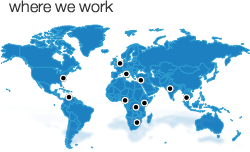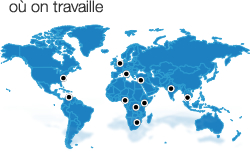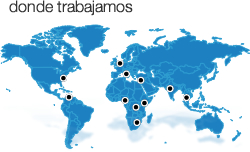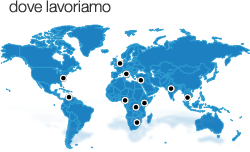| We can survive as adults but children need milk. Products like milk are expensive. If I have kids I'm thinking about the kids all the time. |
After receiving death threats and an intrusion into the family home, Az realized there was no option but to leave Pakistan and seek asylum. "I received threatening phone calls, harassing and abusing me. They said 'If you will not stop your work here we will kill you.'" recalls Az, adding, "My wife also received calls. They told her 'we can rape you because you are a non-Muslim.'" Shocked and scared by the murder of a relative, Az and his family left immediately on a flight to Bangkok.
Since arriving in Bangkok, the question that troubles Az is: "How to survive?" Az adds, "It's not possible for everyone to leave. They need funds. If they come here how will they survive?" The burden of daily survival, combined with social isolation takes its toll on refugees and asylum seekers in Bangkok. "One woman miscarried due to beatings [in Pakistan]. She also miscarried in Bangkok due to depression," reports Az despairingly. A lack of access to medical and mental health care only adds to the pervasive feeling of desperation.
Registration and status determination by the UN refugee agency (UNHCR) is often a lengthy and grueling process for refugees and asylum seekers. Az has been in Bangkok for two years and resettlement to a third country is still not guaranteed, "[UNHCR] take a long time for determination. It’s a very hard interview, very harsh. Five hours in front of an officer. There are hundreds of questions to check credibility," he reports. Az was granted refugee status in 2009 and is waiting on a security clearance for resettlement to the US.
However, Az, like the many other urban refugees and asylum seekers, lives in constant fear of arrest and detention. "I live in fear of being stopped. It depends on the officer. If he is calm he will let me go; if he is angry he will not," says Az. Urban refugees and asylum seekers in Thailand without a valid visa – regardless of whether or not they are documented by UNHCR – are considered 'illegal entrants' and are subject to arrest, indefinite detention, forced return or even deportation.
The inability to legally work means Az must survive on a variety of odd jobs and a small allowance from UNHCR. "We can survive as adults but children need milk. Products like milk are expensive. If I have kids I'm thinking about the kids all the time." Az is one of the more fortunate urban refugees in Bangkok. His command of the English language has allowed him to work as a translator for a number of NGOs. Others are forced to undertake dangerous and physically demanding work for very little pay.
Access to education for urban refugee children is another challenge facing Az and his family. Az explains that language is a barrier to his children accessing mainstream education. "An NGO suggested my child go to a Thai school. I am teaching him English. A Thai school will not teach him English. This is not useful for him." The cost of sending his children to an international school is simply too high as his family struggles to meet their basic needs.
The JRS Urban Refugee Programme in Bangkok provides: emergency financial assistance; material assistance in the form of clothing, hygiene supplies, mosquito nets, bedding, cooking equipment; assistance to find housing; legal advice; psychosocial counseling; police liaison; and health care, material, legal assistance in detention. Despite the best efforts of JRS to support the needs of urban refugees and asylum seekers in Bangkok, gaps in protection remain. The growing numbers of refugees and asylum seekers in urban areas calls for a greater collaboration between government, international institutions and civil society to address the needs of these often neglected and invisible people.
1. This name has been changed to protect his identity
Oliver White, regional communication advocacy officer









